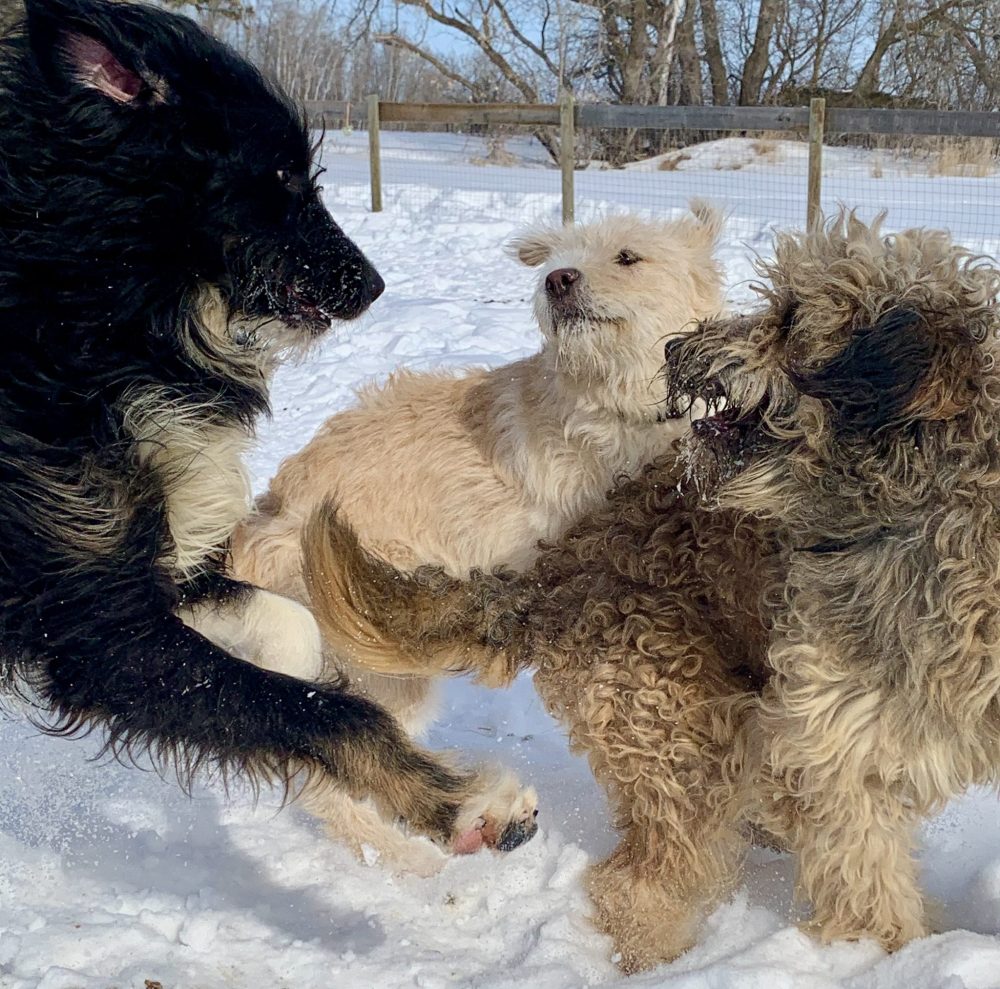Auction service creates dog sale policy after buyer alleges neglect
Advertisement
Hey there, time traveller!
This article was published 20/03/2023 (840 days ago), so information in it may no longer be current.
Grunthal Auction Service has started requiring health certificates and in-person inspections of dogs sold through its online marketplace, after the condition of two dogs purchased last month triggered an investigation by the Chief Veterinarian’s Office.
The dogs, a one-year-old female Bernedoodle and a one-year-old male Bernedoodle, were part of a February consignment sale that included more than 20 dogs. Their pickup location was listed as Gnadenthal, a village west of Altona.
Candice Cronin, owner of Wild Willow Ranch and Rescue in the RM of Brokenhead, bought the two dogs to ensure they ended up in safe hands.

Cronin told CBC News, which first reported the story, that she grew concerned when the seller insisted on meeting at a gas station and wouldn’t let her meet the dogs’ parents. She found both dogs had ear infections, paw infections, and fur matted with feces and urine.
Cronin, who has a background in veterinary medicine, documented the dogs’ condition and contacted the Chief Veterinarian’s Office. A provincial spokesperson said this week the investigation remains ongoing.
“They are starting to put on weight now that they are on high quality dog food,” Cronin said Tuesday in an email to The Carillon. “We are still treating their ear and paw infections. We have a recheck at the end of this week to see if we need to continue with more medication.”
“We are extremely happy with how far they have come so far but still have a ways to go before they are ready for adoption.”
The Animal Care Act allows dogs to be sold through online classified websites and auction houses but places few regulations on those sales.
Darryl Enns, co-owner of Grunthal Auction Service, said in a phone interview that he now requires potential dog sellers to provide a veterinarian certificate for each animal. Auction Service staff must also be allowed to inspect the dog before it will be listed online.
Enns said the Auction Service began listing dogs on consignment about 18 months ago to match buyers with sellers at a time when the COVID-19 pandemic produced a glut of dogs in need of a home.
“We didn’t get into it to harm any animals,” he said.
Enns said it’s often cheaper to buy a dog from a private seller than it is to adopt from a shelter, making it a popular choice for dog owners on a budget.
Enns said the Auction Service voluntarily adopted the new policy and is cooperating with the CVO investigators, who he says assured him he did nothing illegal.
The first consignment sale to use the new policy begins today. As of Tuesday, Enns said no dogs had been included. All proceeds from 10 lots in the sale will be donated to Jenn’s Furry Friends Rescue.
Enns said dogs account for a small fraction of the animals sold through the Auction Service. He said he doesn’t mind if the new policy reduces the number of dog sellers who choose to sell through his business.
Enns said he’s received death threats since last month’s consignment sale. Those making the threats mistakenly believe dogs sold through the Auction Service will end up in “fight farms.” Enns said three provincial inspectors confirmed to him that there are no known fight farms in Manitoba.
Enns said he reported the threats to St Pierre RCMP. A spokesperson confirmed the detachment is investigating threats, adding no arrests have been made.
“If the people that are sending us death threats would spend that time on actually saving dogs, they would probably help reduce the problem,” Enns said.
